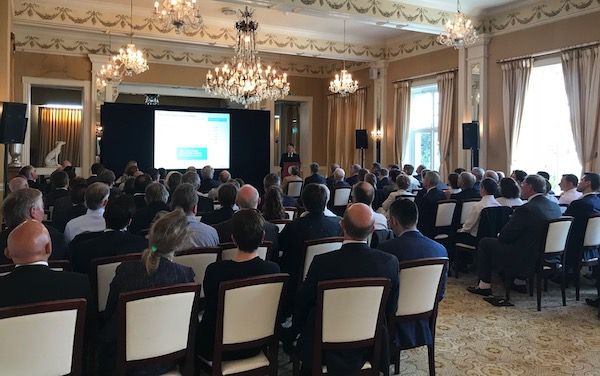

Deloitte UK’s Head of Tax Policy and former President of the UK Chartered Institute of Taxation was in the island last month to talk about international tax changes and their potential impact on Guernsey.
Bill Dodwell was joined by Deputy Gavin St Pier, who updated the audience on the various ways in which the States of Guernsey has been drawn into these developments and what actions have been taken.
Deloitte’s annual tax seminar focused on two buzzwords in international tax - “transparency” and “substance”. Both stem from the way governments are creating new measures to deal with the perceived inadequacy of tax legislation to prevent avoidance and evasion.
Should Guernsey be part of the BEPS inclusive framework? from Bailiwick Express on Vimeo.
Jo Huxtable, a partner at Deloitte and the event host, explained: "Transparency is all about tax authorities having access to all relevant information on taxpayers to ensure that legislation can be enforced.
"Provisions in tax treaties and tax information exchange agreements were the start; FATCA and CRS have had a massive impact on the information governments will receive. Beneficial ownership registers cast the net even more widely by requiring companies and trusts to report details of their beneficial owners."
Substance is the principle by which tax authorities have always sought to challenge taxation in an international context.
"Whether that be transfer pricing, withholding taxes or VAT. It may be management and control, risk and reward, human and technical resources," said Mrs Huxtable. She noted that these are not new concepts and are generally very well understood by businesses in Guernsey.
The panel was asked to share their thoughts on how digital creation will impact on substance, given that the idea that “people mean profits” is less relevant in the digital economy.
Deloitte - BEPS from Bailiwick Express on Vimeo.
Mr Dodwell responded by explaining that there are three schools of thought emerging. He said: "The first group thinks you can look separately at digital activities and have a different rule for the digital economy compared to the physical economy, given that there is a network effect in data-driven businesses.
"There is often extensive sharing of data that creates value in the location where those users are based, therefore it can be argued that some kind of return should be given to that location. That requires entirely different thinking to, say, when Germany sells cars to China.
"Other groups think the impact of digital creation needs to be looked at in the context of all trade and taxation, not just regarding the digital economy.
"There is a third group which doesn’t see that the digital economy poses a question, which we can agree is not a viable option."

The panel welcomed news that Guernsey was not listed as non-cooperative by the EU Code of Conduct when the EU’s so called “blacklist” was published in December. It was acknowledged that there was still work to be done during 2018 to address EU concerns relating to economic substance. Deputy St Pier expressed political commitment to working closely with the other Crown Dependencies as well as the UK and the EU to ensure that there is a clear understanding of what is required.
"The focus currently appears to be on where intellectual property resides, which is unlikely to be a threat to the way we do business in Guernsey, and if that remains the case, the practical impact for much of our investment holding business sector could be very limited," he said.
The second main topic discussed was in relation to the role of double tax treaties in international tax planning. The BEPS project has resulted in the signing of a multi-lateral convention which could mean significant changes and potential costs for jurisdictions with a wide treaty network, as the ability to manage and reduce withholding taxes could be more limited. Mrs Huxtable noted that in many cases this has no impact for Guernsey as its tax treaty network is limited, and for those structures where this may be relevant there are opportunities to preserve existing benefits but this needs consideration on a case-by-case basis.
Finally the discussion moved to transparency. ‘The recent debate in the UK on the possibility of public registers of beneficial ownership in the overseas territories and the Crown Dependencies has reignited discussions around the need for this ultimate transparency, especially as it seems entirely at odds with other regulatory trends such as GDPR," said Mrs Huxtable. "It has also brought into question again the ability of the Channel Islands to make their own laws without interference from the UK."
Comments
Comments on this story express the views of the commentator only, not Bailiwick Publishing. We are unable to guarantee the accuracy of any of those comments.